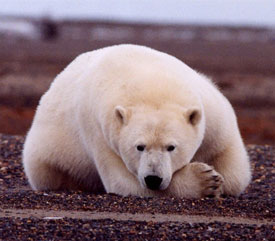Bush administration bans talk on polar bears
Bush administration issues gag order on polar bear talk
mongabay.com
March 8, 2007
The Bush administration has banned discussion of polar bears, sea ice, and global warming among officials traveling overseas, according to environmental groups and the director of the U.S. Fish and Wildlife Service.
“This is positively Orwellian,” said Kieran Suckling, policy director with the Center for Biological Diversity, one of the environmental groups that made the allegation. “Only the worst cynic could admit the polar bear is being driven extinct by global warming, then issue a gag order to stop government scientists from talking about it.”
H. Dale Hall, director of the U.S. Fish and Wildlife Service, confirmed that the policy was in place, but claimed that it was a long-standing one, according to a report from Reuters.
The memo directs foreign travelers on U.S. government business not to discuss “climate change, polar bears, and sea ice”. Further, any foreign travel “involving or potentially involving climate change, sea ice, and/or polar bears” requires special arrangements.
 Polar bear Courtesy of the U.S. Fish and Wildlife Service |
The policy is significant because the administration is currently considering whether to classify polar bears as “threatened” under the Endangered Species Act, a move that could require the government to take measures to protect the species. Since the biggest threat facing the species is melting sea ice, protection could require cutting greenhouse gas emissions contributing to global warming — a step the administration has long opposed. Further, much of the evidence on potential threats to polar bears has been collected by the U.S. Fish and Wildlife Service. A ban on international travel would limit polar bear work to Alaska.
“The administration should be embarrassed by public discussion of global warming, sea ice, and polar bears, since its own do-nothing approach to the climate crisis is the single-greatest threat to the survival of the polar bear,” said Kassie Siegel, climate program director with the Center for Biological Diversity. “Instead of censoring government scientists, however, the administration should start doing something about greenhouse gas pollution.”
Some scientists say that polar bears are increasingly threatened by warming temperatures. A November study published by scientists from the U.S. Geological Survey and the Canadian Wildlife Service, found a 22 percent decline in the size of the western Hudson Bay polar bear population, from 1,194 in 1987 to 935 in 2004. The research also found that only 43 percent of polar bear cubs in the surveyed area survived their first year, compared to a 65 percent survival rate in the late 1980s and early 1990s.
Other reports indicate that drowned polar bears are being found for the first time in Alaska. Researchers speculate that greater distances between ice sheets could be taking a toll on the bears. While bears are capable of swimming long distances—up to 60 miles (100 km) without stopping—it is conceivable that they could suffer from exhaustion during an unexpectedly arduous swim.
The loss of ice also makes it more difficult for bears to find food. Unlike grizzly bears, polar bears aren’t adapted to hunting land animals like caribou, instead feeding primarily on seals. However, recent aerial surveys by the U.S. Fish and Wildlife Service show that, over the past five years, polar bears are changing their habits and spending more time on land, congregating on beaches and scavenging whale carcasses.
“Polar bears live much of their lives on the sea ice, which is fundamental for their survival, at least in terms of their traditional lifestyles. For instance, it’s the sea ice surface that provides them a platform from which to hunt seals and other marine mammals for food,” said Claire Parkinson, a senior scientist at NASA’s Goddard Space Flight Center, in a September news release. A shorter spring hunting season caused by progressively earlier breakup of sea ice, reduces the chances of reproductive success for female polar bears.
In September, Ian Stirling, a research scientist with the Canadian Wildlife Service, noted that the average weight of adult female polar bears in western Hudson Bay have fallen from 650 pounds in 1980 to just 507 pounds in 2004, a 22 percent reduction.
Extrapolating from these developments, some scientists believe that polar bears could be extinct in the wild within the next century. While the last survey in 1997 suggested that polar bears in Alaska were not endangered, next year’s update might come to a different conclusion. Scientists estimate there are currently 20,000 to 25,000 polar bears world-wide.
This article used information from prior mongabay.com articles and quotes from a Center for Biological Diversity news release.







